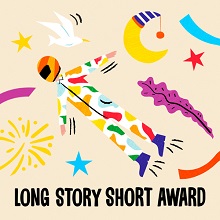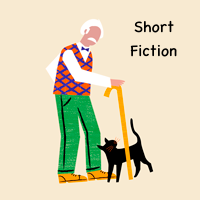
The old girl has always been afraid of stillness. Maybe this is why she wasn’t named after flowers like each of her sisters, like her mother, her hands always fluttering out from the nest of her lap, her feet falling hard on the floor. “Sit still, Azizam,” Maman used to say, raising a lid, steam settling on her glasses. When she was a young girl, she’d stand and skip around the kitchen singing “Azizam, Azizam, Azizam” as she followed Maman around to the different dishes simmering yellow in their pots and pans. Now, she sits still, waiting. And you know she loved you the same way, even though she never met you. She always said how handsome you are, how she wishes to see you. She always picked a doll for you, shopping, and says how she will play together with you when you come.
On the television behind her and to the left in the corner of her small room, a newscaster reports on the dual execution of a young man, to take place tonight at a prison in Shiraz. When the newscaster speaks, his mustache stays as still as the picture of the young man hovering just above him. She sees all this from her window, sees the man’s mustache moving with the weight of his words, the young man’s dark, prominent brow, black eyes. She was a good girl, she just didn’t grow like the rest of us. She was good and bad, depending how you look.
The old girl has been the same age for many years. This makes the young man just a few years older than the old girl who sits at the window in front of her garden, her wrinkled cheeks blushing at the young man’s reflection in the mirror like a ghost’s through which she can see birds land on the bud of his face, the branch of his chin, take off again. Where the young man is now isn’t in a prison in Shiraz but hovering just within her garden, “Baghche Eram-e man,” she calls it. Like Rumi’s, or Attar’s, or even her Maman’s—more beautiful than them all. Her little garden of Eram. Those damn, idiot doctors! I will get them for all they have! I swear it. For Nina. I will get them.
Her father used to say visiting this garden was like looking through a big window to heaven. “One day, moosh, I’ll take you there.” He’d say this and frown at Maman, bending and picking in her garden. Nina loved him most (they all did), loved his plans for her, even though she hated his frowns, wished to smooth them out like dough. Even though he’s the only one she can’t plant in her garden. Even though he left first. She was lost without grandpa, without grandma. I can’t stand to think of her that way—why should a good girl like her be alone?
She’s never actually been to the big window to heaven, but that’s okay, she informs the staff at Farmanieh Nursing Home in Tehran, because she can go to the little one anytime she likes. And what’s better, really, small things to have or huge things to borrow? They stare at her, with less expression, even, than her dolls. “This is very rude,” she tells them.
“Mard-e jun,” she sings to the window. Young man.
“Azizam,” Mard-e jun sings back, the Alborz mountains peaked just beneath the crook of his phantom nose. The old girl makes a sound of delight, gives a furtive glance to her dolls lined up tidily on the shelf above her bed, then looks away from their chiding. She was always a tidy, a clean, girl. Sensible, besides for her fits. But she couldn’t help this. We never blamed her.
She knows Mard-e jun has been executed (will be executed) but can’t possibly think of him as dead. Twice-dead. She only imagines the smell of him, simmering—the sweat off his brow like dew settling down in the morning on top of her garden. She reaches out to him, her garden. She blushes.
“Mard-e jun,” she repeats to the birds.
I will get them. All that money, and this is the treatment she had? Such a hard life and for what? For it to end this way—I will get them for everything. Everything they have.
Another thing about the old girl is that she falls. She’s found it very difficult to do what she’s supposed to when she doesn’t believe in it. She doesn’t believe in the aging of her body, so she falls. Dances and falls. She loved only to dance and to grow her garden. She was like grandma’s shadow. In and out the garden all day. She didn’t bother a fly.
The old girl has known for some days now that the throb beneath her head-bandage is worse than usual, like a frog’s throat but swelling in instead of out at the side of her head. But she won’t tell the workers that. She won’t tell them she can see red crescent moons now, if she stands in front of the vanity in her room and rolls her eyes all the way up. She knows what’s coming for her, and she likes the prospects of this better: Maman, and Baba, and her sisters. How wonderful, her small and strong frame dancing stone to stone in Maman’s garden with her sisters, again. She wanted only to meet you.
This is another reason that she blushes at the image of the young man growing roots in her garden. She can’t imagine dying more than once. Young and brave, she thinks of the young man. Soon the workers would come to her room. “Beeya, Nina. Come down from there.” They’re here, she thinks. The young man would come. They’d dance. When she danced, you could forget she had any problems completely.
She can feel the small petals of her garden and the highest peak of the Alborz even now, all resting like a face against her chest. She swells. Tonight, they’d fall together. The old girl and the young man. And again. She was really a good girl. Her entire life. I wish you could have come. I wish you could have watched her dance. We have the videos, anyway. When you come, we can watch them together. Hopefully you come soon. When you come, you can help us put her on the TV. You can watch how she danced.



